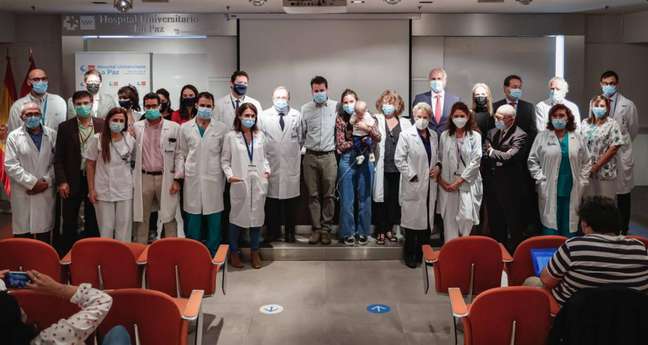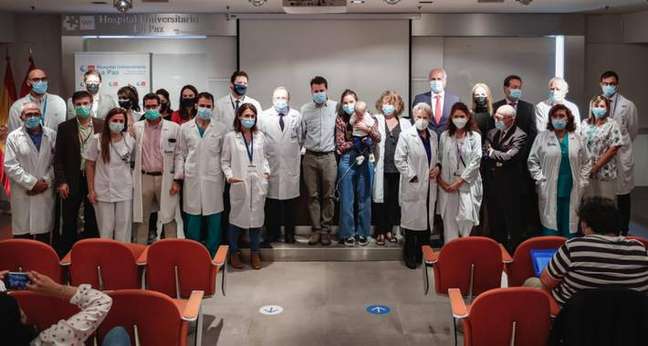The procedure in Spain used “asystole”, which promotes oxygenation of tissues and organs outside the human body
Emma, a 13-month-old Spanish girl, is the first case in the world to receive multidisciplinary treatment intestine “in asystole”, a technique in which the donor’s organs and tissues are maintained with extracorporeal oxygen once death is ascertained.

The procedure, which represents a milestone in this type of transplant, was performed at the public hospital in Madrid, in Spainand was released on Tuesday 11 by the regional government in an act attended by the director of the National Transplant Organization (ONT), Beatriz Domínguez-Gil, the hospital’s medical team and the girl’s parents.
The child was transplanted by donation in “asystole”, which consists in the donation of organs and tissues by a person who is diagnosed dead, after confirmation of the irreversible loss of cardiorespiratory functions (absence of heartbeat and spontaneous breathing). The organs are preserved with an extracorporeal oxygenation system.
?? Getting to know Emma and her standard of hers is the best way to see the transformative effect of #transplant and cheers all the time @ONT_esp to continue working.
She is the first recipient of a multivisceral asystole transplant in the WORLD
Congratulations to the La Paz team#GraciasDonantes pic.twitter.com/jnNF2t6jvw
– National Transplant Organization (@ONT_esp) 11 October 2022
This technique “allows you to use organs that would otherwise be lost,” according to experts. The girl, who is already at home in good health, had been diagnosed with “intestinal insufficiency” from the first month of life, and was in a very deteriorated state of health, the Madrid health authorities explained in a statement. .
Although 30% of the candidates had died on the waiting list, a donation intestine for “asystole” had never been used because it was believed that it would not work due to the particular characteristics of the organ. However, the Congenital Malformations and Transplantation Group of the Hospital de La Paz Health Research Institute initiated a three-year research project in which it experimented and demonstrated that the donated intestine could be successfully received.
The operation was a “success” which was attended by professionals from seven pediatric specialties. According to the Madrid Department of Health, the number of patients who need an organ transplant to stay alive has increased in recent years and “donation in asystole has become an increasingly important source, since in adults it represents one third of donations. of organs “made in Spain.
This technique was first used in La Paz in 2014 in adults and in September 2021 in children, although the pediatric transplant team previously performed it in three hospitals in Madrid and in the Basque Country (north) and of Andalusia (south). ), the first in 2018.
Intestinal transplants for asystole
The intestine is a lymphoid organ closely linked to the immune system and which, under normal conditions, is colonized by microorganisms. Therefore, rejection and the possibility of infection are more frequent than with transplants of other organs. It is a very complex action from a technical point of view and another challenge is to find a suitable donor, considering the low weight that people who need the transplant usually have.
According to the Madrid Health Agency, the asystole technique allows, after death certification, organs to be preserved by perfusion (pumping blood into the lungs) with oxygenated blood through the extracorporeal membrane oxygenation system (ECMO).
In this way, the organ to be transplanted does not deteriorate. Controlled donation of asystole has been shown to have similar results to classical donation in the case of brain death and its use is increasing in other countries as well. With EFE

+The best content in your email for free. Choose your favorite Earth Newsletter. Click here!
Source: Terra
Benjamin Smith is a fashion journalist and author at Gossipify, known for his coverage of the latest fashion trends and industry insights. He writes about clothing, shoes, accessories, and runway shows, providing in-depth analysis and unique perspectives. He’s respected for his ability to spot emerging designers and trends, and for providing practical fashion advice to readers.





![Everything starts here: What are you waiting for on Tuesday, July 22, July 22, 2025 [SPOILERS] Everything starts here: What are you waiting for on Tuesday, July 22, July 22, 2025 [SPOILERS]](https://fr.web.img2.acsta.net/img/52/4a/524a493b6d4b1233fce62af9a6caf759.jpg)


